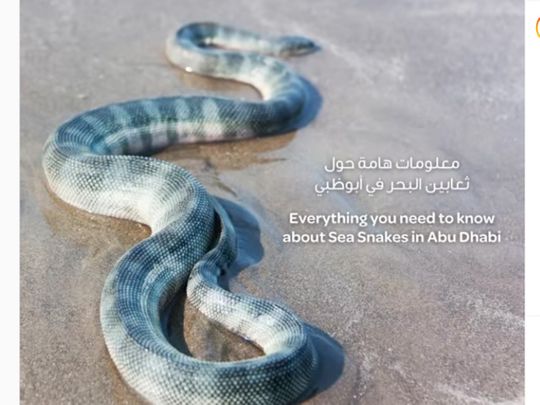
Abu Dhabi: Abu Dhabi has called on residents to steer clear of sea snakes, which tend to gather in the shallow waters of the emirate in the winter.
In a social media alert, the Environment Agency Abu Dhabi (EAD), the emirate’s environment sector regulator, urged beachgoers to avoid handling a snake, including ones that aren’t moving.
“Keep away from stranded sea snakes, and do not handle them even if they look dead, as some of them may just be sluggish,” the EAD said.
“Although they are poisonous, they rarely bite, and only when provoked or scared. In case of a bite, seek immediate medical attentions and inform health authorities. For emergencies, call the Abu Dhabi Government Call Centre on 800555,” it added.
The winter months see a number of marine creatures visiting the emirate’s beaches. According to the EAD, sea snakes in Abu Dhabi live in open and shallow waters, coral reefs and beacher, and tend to gather during the winter months when the temperatures drop below 22 degrees Celsius.
Turtle rescues
Sea turtles can also retreat to the beaches, or end up stranded when they are cold stunned. The EAD has therefore earlier called on residents to report any stranded turtles so that marine experts can help rehabilitate the creature.
According to The National Aquarium, which operates a turtle rehabilitation programme with the EAD, over 200 turtles end up stranded on the emirate’s beaches when water temperatures dip every winter, and are then rescued.
Water monitoring
The EAD also recorded a dead Bryde’s whale in Abu Dhabi waters this winter. The great fish was towed, analysed and disposed of by marine experts. In a post, the EAD stressed the importance of the fish towards maintaining the ecological balance of marine ecosystems.
What to do if you see a stranded marine creature
-Maintain a safe distance from the animal in order to protect yourself, and to avoid provoking or scaring the creature.
-Seek immediate medical attention in case of a bite.
-Call the Abu Dhabi Government Call Centre on 800555 to report the sighting to the EAD.
-Also report the animal’s sighting on the EAD’s Citizen Science app in order to aid conservation efforts.












